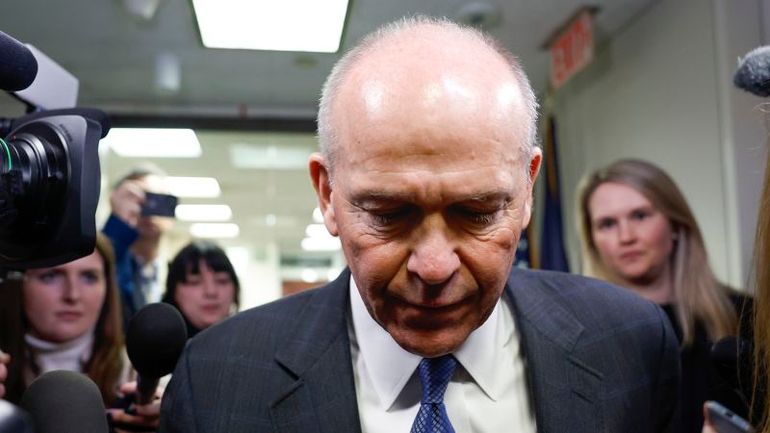
Boeing CEO Dave Calhoun Announces Departure Amid Safety Concerns

In a significant leadership change at Boeing, CEO Dave Calhoun has revealed his plan to depart the troubled company by the end of this year. The chairman and the head of the commercial airplane unit are also set to depart, marking a major shift in leadership.
Boeing CEO Dave Calhoun announced on Monday that he plans to step down from his position by the end of the year. This decision marks a significant change in the leadership of the troubled company. In addition to Calhoun, the chairman of Boeing and the head of the commercial airplane unit will also be departing.
Boeing CEO Dave Calhoun, pictured in January.
Boeing CEO Dave Calhoun, pictured in January.
J. Scott Applewhite/AP
Related article
Dave Calhoun was hired to fix Boeing. Instead, ‘it’s become an embarrassment’
Boeing's chairman, Larry Kellner, will not be seeking re-election as a board director. The board has chosen former Qualcomm CEO Steve Mollenkopf to take over his position.
Additionally, Stan Deal, the CEO of Boeing Commercial Airplanes, is stepping down from his role and retiring. Stephanie Pope, who has been Boeing's chief operating officer since January, will be assuming his responsibilities with immediate effect.
Boeing has faced a series of challenges for over five years, including two tragic crashes of the 737 Max in 2018 and 2019 that resulted in the loss of 346 lives. Most recently, an incident occurred in January where a door plug blew out of the side of an Alaska Airlines 737 Max, causing a significant hole in the plane. These issues have forced multiple groundings due to safety concerns and have resulted in more than $31 billion in total losses.
In a letter sent to Boeing employees on Monday, Calhoun described the Alaska Airlines incident as a "watershed moment for Boeing."
He announced his departure plans with a promise to address the company's issues and steer it back towards recovery and stability. The world is watching us, he emphasized.
During an interview on CNBC, Calhoun stated that leaving the company was entirely his decision. However, his departure comes amidst criticism from CEOs of major airlines that Boeing relies on for plane purchases. These CEOs had requested a direct conversation with the Boeing board, a process Calhoun downplayed as normal, despite the rarity of customers speaking directly to directors.
In this March 14, 2019, file photo, a worker walks next to a Boeing 737 MAX 8 airplane parked at Boeing Field in Seattle. Boeing said Thursday, July 18, it will take a $4.9 billion charge to cover possible compensation to airlines whose Max jets remain grounded after two deadly accidents.
Boeing announced on July 18 that it will incur a $4.9 billion charge to potentially compensate airlines affected by the grounding of its 737 MAX 8 airplanes. The decision comes after two tragic accidents involving the aircraft model.
Ted S. Warren/AP
Related article
Boeing timeline: Inside the air giant’s turbulent journey in recent years
Calhoun explained to CNBC why he chose to remain with the company until the end of the year instead of leaving right away. He emphasized the importance of facing challenges head-on and learning from past mistakes. He stressed the need for proactive measures and necessary changes within the company.
“We will overcome this,” he reassured. “I have promised the board that I will make sure of it.”
Calhoun, who has been a board member at Boeing for a long time, took over as chairman of the company towards the end of 2019. This happened after the board removed Dennis Muilenburg from the position. Following Muilenburg's departure in December of the same year, Calhoun was appointed CEO and officially began his role in January 2020.
Calhoun took over as Boeing's CEO during the 20-month grounding of the 737 Max, caused by a design flaw linked to two crashes. This happened right before the Covid pandemic hit, leading to a sharp decline in air travel and significant losses for the airlines that buy Boeing planes.
Despite losing over 27% in value this year, Boeing's shares surged by 4% in premarket trading following the announcement.
This is a developing story and will be updated.
Editor's P/S:
Boeing's recent leadership shakeup, with the impending departures of CEO Dave Calhoun, Chairman Larry Kellner, and Commercial Airplanes CEO Stan Deal, marks a significant turning point for the troubled aviation giant. These changes come amid ongoing challenges for the company, including the aftermath of the 737 Max crashes, production delays, and safety concerns. Calhoun's announcement that he plans to step down by the end of the year, along with the departure of other key executives, suggests a need for fresh perspectives and renewed focus on addressing the company's issues.
The search for Calhoun's replacement will be critical, as Boeing navigates a challenging environment. The new CEO will need to restore confidence among customers, regulators, and investors, and prioritize safety and innovation. While Calhoun's departure is a sign of change, it remains to be seen whether the company's new leadership can steer Boeing back to a path of stability and growth.















